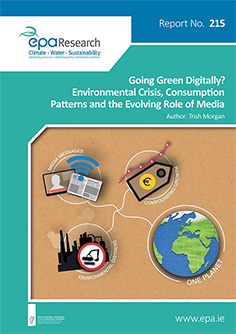Author: Trish Morgan
Summary: Research Report 215 on Going Green Digitally? Environmental Crisis, Consumption Patterns and the Evolving Role of Media

The “Going Green Digitally” project identifies key systemic economic pressures that can potentially impede sustainability pathways. These pressures relate to economic growth and its increasingly tenuous relationship with social and environmental progress. It identifies tensions between policies that encourage economic growth, and those that promote sustainability. The findings suggest there is a tendency towards economic ‘fixes’ that merely defer crisis and move systemic problems around in time and space. A key environmental pressure is that our understanding of the relationship between economy, environment and society is limited by a focus on economic viability. The report advocates the need for a more integrated and holistic approach that acknowledges the inextricable link between economy, environment and society. Along with this is the need for more awareness of the social and environmental implications of solutions applied solely in economic terms. The media are identified as industries that require revenue from advertising, and this emerges as a key pressure for sustainability.
Through a review of policy literature, this project finds that key socio-economic and systemic pressures are not necessarily resolved through policy instruments alone. It introduces the phrase the ‘techno-finance fix’ to capture how responses to actions towards sustainability frequently prioritise technology, in conjunction with a faith in market-based solutions. In the Irish context, the project reveals tensions between economic development and sustainability. It shows that at the policy level there are discussions around ‘spontaneous decarbonisation’ that suggest an automatic transition. While some best practice was also found through a survey of regional (EU) policy, the research was critical of the situation in Ireland in light of the systemic issues identified. Best practices in other areas demonstrate that Irish policy can be informed by progressive policies enacted successfully in other areas, particularly if enacted in a combination of top-down and bottom-up initiatives.
In light of the systemic issues identified, a key solution is in the area of integrating policy between actors. This report suggests that different solutions are possible when we begin to consider the relationship more as a ‘metabolism’ than separate systems. The need to move beyond the ‘siloing’ of policy to develop more integrated solutions was reinforced. This includes planning for possible ‘reverse globalisation’ where a turn to more local production may be required as part of low-carbon transition. The project also found ample scope to explore non-market solutions to behaviour change. Positive interventions towards behaviour change were discovered to include those that foster community and social cohesion, and move beyond economic measures. Solutions such as local currency initiatives, EPA, Stop Food Waste, Initiative, Grow it Yourself (GIY), Transition Towns, and remunicipalisation facilitate in moving communities beyond the instabilities of international finance and privatisation, while addressing issues of ‘reverse globalisation’ and societal wellbeing and cohesion.
https://www.epa.ie/media/epa-2020/publications/research/EPA-RR-215_cov_20mm[1].jpg